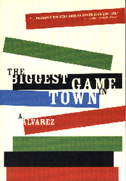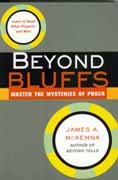
The Biggest Game in Town
by A. Alvarez
Here's the classic that's now back in print. Both an acclaimed author and poker player, A. Alvarez combined his two talents to pen this work which gives a compelling inside look at the world of Las Vegas, of professional poker, and the extremes that go along with each. With the skill of observation and the talent for writing down what he sees, Alvarez captured the psyches of the people who challenge each other in the world's biggest poker tournament, the annual World Series of Poker. For those who have never witnessed this tournament, this book will put you right in the thick of it and you'll think you're actually rubbing elbows with some of the legends of poker.

Beyond Bluffs
by James McKenna
This book contends that the game of poker is in reality a game of psychology. james McKenna is a poker columnist and a pychotherapist. This book will teach you to play your opponents as well as you play your cards. Learn how to read and give bluffs. Predict what the players around you are thinking.
Machiavellian Poker Strategyby David Apostolico
In Tournament Poker and the Art of War, David Apostolico showed players how to use the strategies explored in Sun-tzu's military manual to dramatically enhance their tournament play. Now he focuses on that other timeless masterpiece of tactical thinking—Machiavelli's The Prince—and reveals its uncanny application not just to tournament play, but to all forms of poker.
Read Full Review of 'Machiavellian Poker Strategy'
Read Full Review of 'Machiavellian Poker Strategy'
Mathematics of Pokerby Bill Chen
Poker has often been played as a game, by those who have learned it as a game and who have relied on thier ability to play well, to play good hands, and to read other players tells in order to improve thier chances of winning. However, there is now a new set of players who do not rely on these things, but have turned the game of poker into a game that can be won by applying the tools of computer science, and mathematics to thier hands. This new approach relies on quantitative analysis and mathematics. This book strives to take this seemingly difficult task and make it easy and understandable for players with less mathematic knowledge or skill.
Read Full Review of 'Mathematics of Poker'
Read Full Review of 'Mathematics of Poker'
Middle Limit Hold'em Pokerby Bob Ciaffone
This book is written for the player who knows how to play hold'em and wants to improve his or her proficiency and move from low limit to middle limit, specifically when playing in public cardrooms or on the Internet.
The authors explain the theory behind middle-limit hold'em and illustrate it with hundreds of examples (five hundred hands). Every phase in a hand's development is explained in detail with key ideas and a set of problems. A thorough analysis is given on how an expert player would approach each problem. The book is broken into seven topics: Holdem Concepts, Preflop Play, Play On The Flop, Play On The Turn, Play At The River, Special Topics (bluffing, checking and calling, check-raising, etc) and Non-Standard Games. Also a page on Flop Odds Against Improving On Next Card.
Read Full Review of 'Middle Limit Hold'em Poker'
Moneymakerby Chris Moneymaker
Americans, gamblers in particular, love to invest (or bet) a little to win a lot. And when it comes to poker, since the beginning of major tournaments players have fantasized about peeling off a couple of twenties and winding up with millions and the adoration of the world. It's a lofty goal but Chris Moneymaker lived the dream, winning the 2003 World Series of Poker in Las Vegas, and inadvertently changing the perception of the game for millions more--nationally and internationally. Now, two years later comes a well-crafted, colorful, entertaining work about the player, the game and the event, titled Moneymaker (How An Amateur Poker Player Turned $40 Into $2.5 Million At The World Series of Poker).
Read Full Review of 'Moneymaker'
Read Full Review of 'Moneymaker'
More Hold'em Excellenceby Lou Krieger
This is a new expanded edition which goes beyond the basics; it takes you into the mind and decision-making processes of professional poker players by providing solid information and advice on a broad spectrum of sophisticated topics. Krieger covers the importance of proper decision-making; why patience and position are vital; the flop; early, middle, and late position; common mistakes; how to play in loose, aggressive games; tells and much more. Includes the Lou Krieger full color 'Start Chart', showing which hands are playable in which situations.
Ms Poker: I'm Not Bluffing - Boxed Setby Susie Isaacs
Isaacs is a tournament poker competitor who has collected a roomful of first-place trophies and was the first woman to win the World Series of Poker ladies championship back-to-back in 1996 and 1997. In 1998, she placed 10th in the $10,000-event vying for the $1 million first prize. Here she combines two books to create a boxed sent. she In book I she compiled the best of the hundreds of articles she's written about poker over the years. In this highly biographical work she also includes many new articles. In Book II, she draws upon her own tournament success to teach players how to finish in the money in limit and no-limit hold'em and seven-card stud.
Read Full Review of 'Ms Poker: I'm Not Bluffing - Boxed Set'
Read Full Review of 'Ms Poker: I'm Not Bluffing - Boxed Set'
Nick Gullo's Guide: Operating a Professional Poker Roomby Nick Gullo
The author has been involved in the casion business since graduating from Loyola University Law School. He learned about poker and other casion games from his father who was a poker player and in 1965, he began his formal experience in the casino business, working his way up from a Downtown shill to owner and president of a casino. Now with contributions from Jan Fisher, he has put together 35 chapters that cover all aspects of running a poker room. These include etiquette, hand rankings, betting terms, general procedures, shuffle and cut procedures, wagering rules, employee rules, the rake, fills, running chips, brushing, blinds (specificially how to handle missed blinds), general button procedures, kill pots.
Read Full Review of 'Nick Gullo's Guide: Operating a Professional Poker Room'
Read Full Review of 'Nick Gullo's Guide: Operating a Professional Poker Room'
No Limit Hold 'Em: Theory and Practiceby David Sklanskly
Poker's premier theorist (Sklansky) teams up with one of the game's most respected instructors (Miller) to take the theoretical approach to high-stakses hold'em. Their work covers critical concepts such as manipulating the pot size, adjusting correctly to stack sizes, winning the battle of mistakes, reading hands, and manipulating opponents into playing badly. It breaks this complex game down to bare bones with thorough and easy to follow analyses. If you are looking to improve your cash game or tournament play, this is a must read.
Read Full Review of 'No Limit Hold 'Em: Theory and Practice'
Read Full Review of 'No Limit Hold 'Em: Theory and Practice'
No-Limit Lifeby Charlie Shoten
A metaphysical self-help book that highlights the authors professional poker career on the World Poker Tour where in the year 2003 he was ranked in the top ten turnament players in the world. It shares the author's roadmap to freedom that helped him let go of the poisonous memories, thoughts, ideas and beliefs he held onto, that had been sabotaging his game and his life ever since he can remember.Contains 61 cartoons and 41 (mostly Shakespeare) quotes to get his points across and justify his conclusions.
Read Full Review of 'No-Limit Life'
No-Limit Texas Hold'em: A Complete Courseby Angel Largay
Angel Largay shows students what works and what doesn’t, common mistakes, and how to get beyond them. Today, many of his students are full-time professional players. If you’re aspiring to become a professional—or simply to play like one—No-Limit Texas Hold’em will help you make it happen.
Read Full Review of 'No-Limit Texas Hold'em: A Complete Course'
Read Full Review of 'No-Limit Texas Hold'em: A Complete Course'
Omaha Poker - 21st Century Editionby Bob Ciaffone
This book thoroughly explains Omaha, the action-packed poker form that uses four cards in your hand. It was originally printed in 1984, then greatly expanded in the Millennium Edition (1999) to give deeper coverage of the popular form for limit play, high-low split eight-or-better. Ciaffone has now republished it in 2006 under the new title 'Omaha Poker.' The entire book has been rewritten, with 20 extremely informative pages added on pot-limit Omaha high. If you have an earlier edition of the book, no need to buy the new one -- unless your game is pot-limit Omaha high, in which case you need the new book big time.
Read Full Review of 'Omaha Poker - 21st Century Edition'
One of a Kindby Nolan Dalla
Dalla and Alson, have written a solid tribute to The World's Greatest Poker Player in a combination tribute, biography and analysis of him and what he brought to the game and how he affected the people around him. Whether he's remembered as a pure intuitive player, a gifted autistic genius or just a contrarian who loved to swim upstream, against the tide at all times, Ungar will remembered for his great skills at gin rummy (one of the most feared players in the world) and the three championships at the World Series of Poker. Illustrated and indexed, the book is a sort of roller-coaster ride through Ungar's life--his ups and downs, the highs and lows.
Read Full Review of 'One of a Kind'
Read Full Review of 'One of a Kind'
Online Ace -- A World Series of Poker Champion's Guide to Mastering Internet Pokerby Scott Fischman
Written by a WSOP champion specifically aimed at online players, as well as those hoping to make the transition from computer games to live games. Few have made that transition as successfully as two-time World Series of Poker champion Scott Fischman. Here he shares his expert insight, money-making tips, and priceless strategies for Internet poker, giving readers instruction that can be put into practice immediately. Fischman's success on the live tournament circuit is a testament to the value of Internet poker (which he still plays for more than 10 hours a day).
Read Full Review of 'Online Ace -- A World Series of Poker Champion's Guide to Mastering Internet Poker'
Read Full Review of 'Online Ace -- A World Series of Poker Champion's Guide to Mastering Internet Poker'
Online Pokerby Doyle Brunson
Poker's elder statesman teaches the novice what to expect in the world of online play including providingmore than two dozen poker strategies and identifying online 'tells.' In a dozen concise but well-illustrated chapters he discusses the impact of televised poker and how online poker now ushers in a new era. One chapter offers a list of places to play with information on where you may learn to play or discuss the game and the benefits of online learning. Brunson discusses how to download software, fund your account, and how to get a taste by playing small money before advancing to bigger.
Read Full Review of 'Online Poker'
[ << previous 25 poker books ] [ next 25 poker books >> ]
















